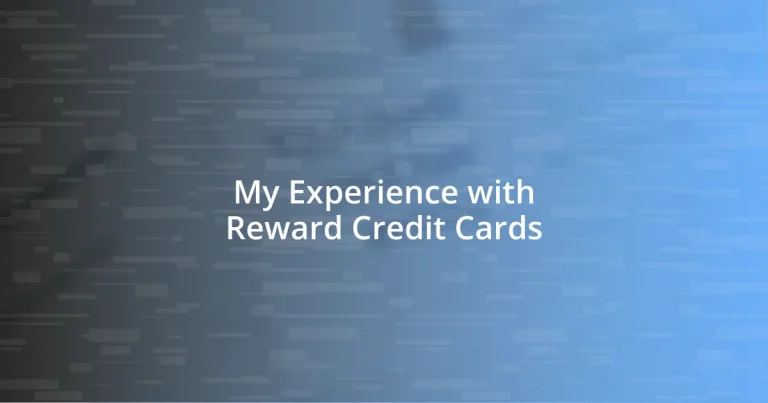Key takeaways:
- Reward credit cards offer benefits like cash back and travel points, turning everyday spending into financial rewards.
- Choosing the right reward card involves analyzing spending habits, understanding reward structures, and considering fees and redemption options.
- Effectively managing credit card debt requires prioritizing high-interest balances, creating a budget, and preparing for unexpected expenses.
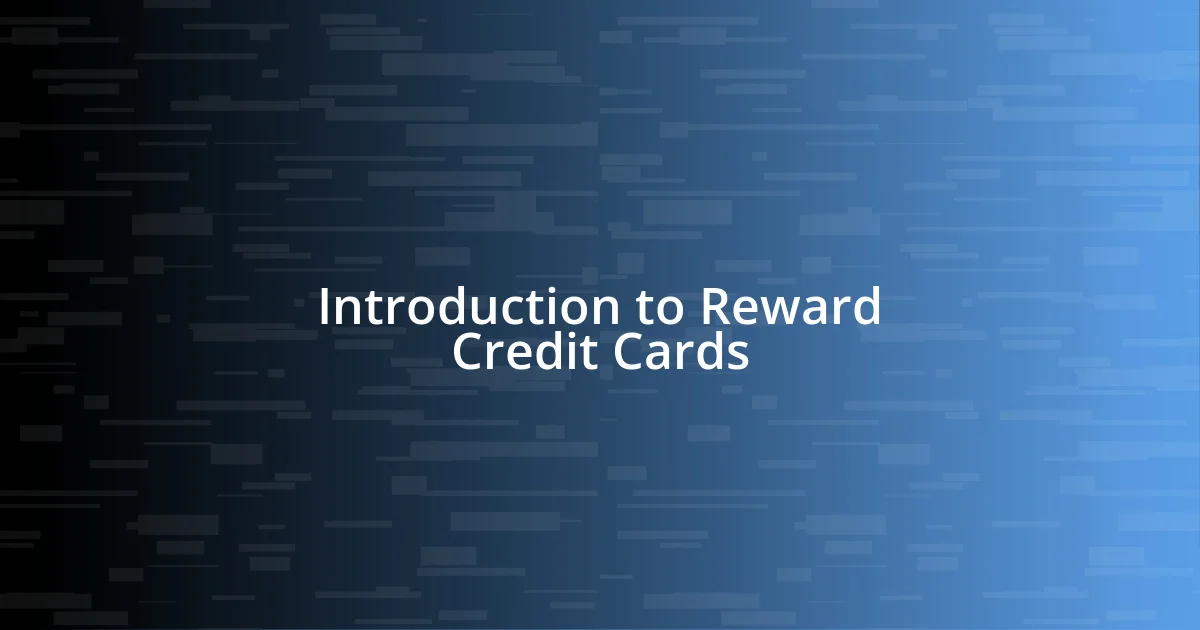
Introduction to Reward Credit Cards
Reward credit cards have become popular tools for earning benefits while making everyday purchases. I still remember the thrill of opening my first reward card and the excitement that came with earning points for something as simple as buying groceries. It made me wonder: why not get something back for spending money I’d typically spend anyway?
When I first started using rewards credit cards, I found it empowering to see my points accumulate after every transaction. It felt like a game; the more I spent, the more rewards I earned. I often pondered how these programs turned mundane purchases into opportunities for travel, gifts, or even cash back. Isn’t it fascinating that something as straightforward as a credit card could change the way we think about spending?
Over the years, my experience has taught me to choose my reward credit cards wisely by considering what benefits align with my lifestyle. Some people thrive on travel rewards, while others prefer cash back. I used to think, “What’s the catch?” but as I navigated the world of rewards, I realized that with the right strategy, they truly can enhance your financial life.
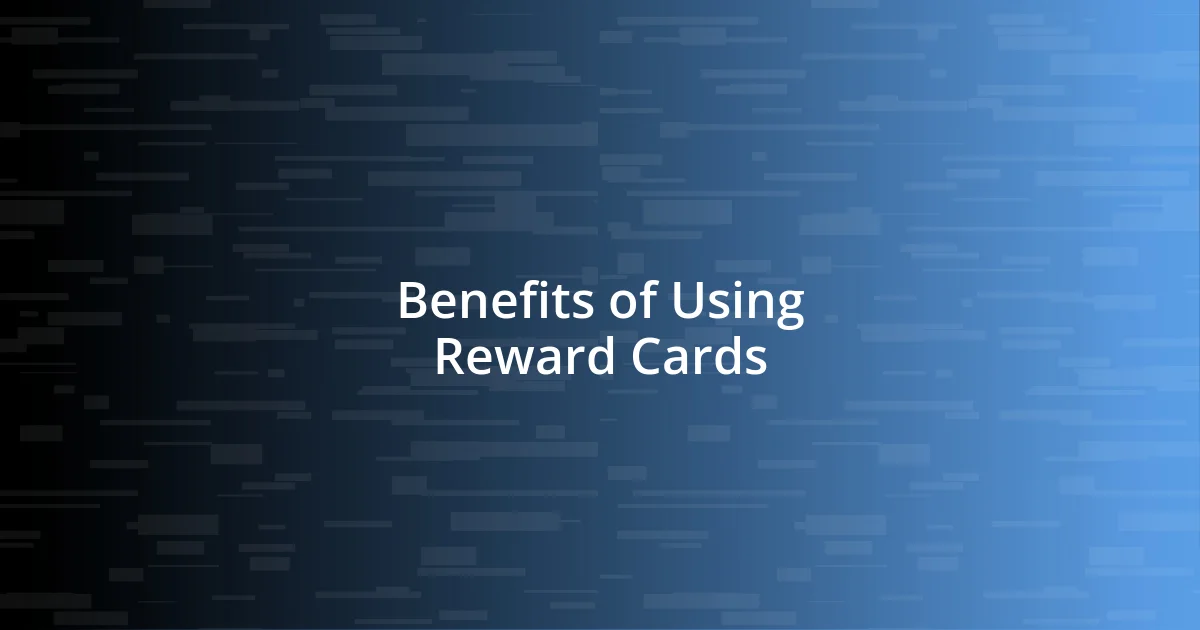
Benefits of Using Reward Cards
Reward cards offer several compelling benefits that can enhance your financial experience significantly. For instance, I often find myself enjoying the instant gratification of cash back. On a recent grocery trip, I was pleasantly surprised to see how much I earned back just for buying essentials. It made the shopping experience feel less like a chore and more like an investment in my financial rewards.
Another noteworthy benefit is the ability to earn points towards travel. When planning my last vacation, I discovered that my accumulated points from everyday spending could cover not just my flights but also hotel stays. This realization transformed my routine expenses into exciting travel opportunities and motivated me to be more intentional about my spending habits.
Moreover, reward cards frequently come with bonus offers that can be incredibly useful. I remember signing up for a new card that featured double points for dining out. This small detail changed my restaurant outings from merely enjoyable evenings to ways of stacking points effortlessly. It’s like having a personal incentive to enjoy life with friends and family!
| Benefit | Description |
|---|---|
| Cash Back | Earn money back on everyday purchases, making spending feel rewarding. |
| Travel Rewards | Accumulate points that can offset travel costs, allowing for dream vacations. |
| Bonus Offers | Take advantage of promotional periods that maximize your earning potential. |
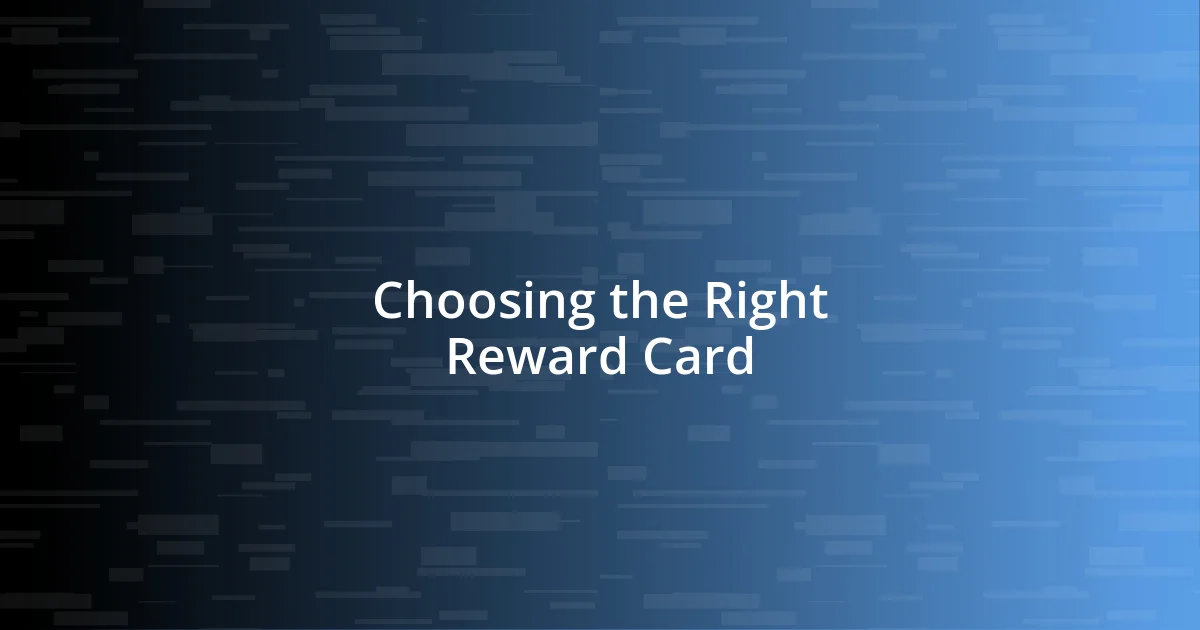
Choosing the Right Reward Card
Choosing the right reward card can feel overwhelming, especially with so many options out there. I remember sitting down with a notebook, scribbling down my spending habits and preferences to get clarity on what I truly needed. By identifying my priorities — like maximizing travel rewards and focusing on cash back for everyday purchases — I was able to nudge myself toward the perfect card.
Here are some key factors to consider when choosing a reward card:
- Spending Patterns: Analyze your monthly expenses to see where you spend the most. Are you dining out a lot, or do you spend more on groceries?
- Reward Structure: Look for cards that offer rewards in categories that match your spending, such as travel, cash back, or groceries.
- Annual Fees: Consider whether the benefits of the card outweigh its annual fee. Sometimes, a card with a fee provides better rewards than a free card.
- Redemption Options: Make sure the redemption process is straightforward and the options appeal to you, whether it’s travel, cash back, or gift cards.
- Sign-Up Bonuses: Many cards offer enticing sign-up bonuses. Think about how quickly you can meet the spending requirement to earn those bonuses.
Reflecting on my journey, I learned that understanding my own financial habits not only improved my spending but also made the whole rewards experience far more satisfying.
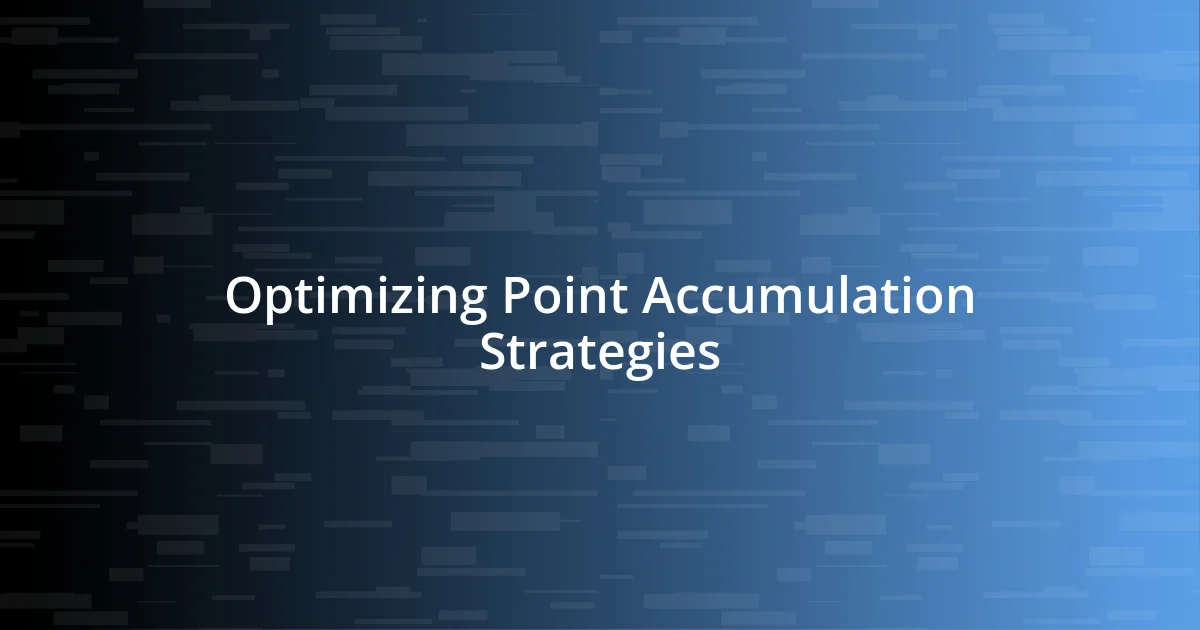
Optimizing Point Accumulation Strategies
Some of the best strategies for optimizing point accumulation involve intentional spending. For instance, I’ve found that aligning my purchases with the rewards categories on my card can lead to a noticeable boost in points. The other day, I realized that by using my rewards card for monthly bills—like my phone and internet—I was effortlessly stacking up points I hadn’t even considered. Have you thought about how your spending can morph into a savvy point accumulation strategy?
Tracking bonus categories can significantly enhance the way I earn points. Last month, while exploring my card’s promotional calendar, I discovered a period offering triple points on gas purchases. I made a point to fill up my tank that week, which felt like a small victory every time I fueled my car. This realization made me think: are you making the most of your card’s special promotions, or just letting them slip by?
Furthermore, I’ve come to appreciate the value of setting reminders for significant spending opportunities. I often align my shopping with holidays to maximize points—like purchasing gifts during festive periods or planning larger grocery runs around sales. This little strategy not only increases my points but also adds a layer of fun to usually mundane tasks. Have you considered how a little planning can turn everyday expenses into rewarding experiences?
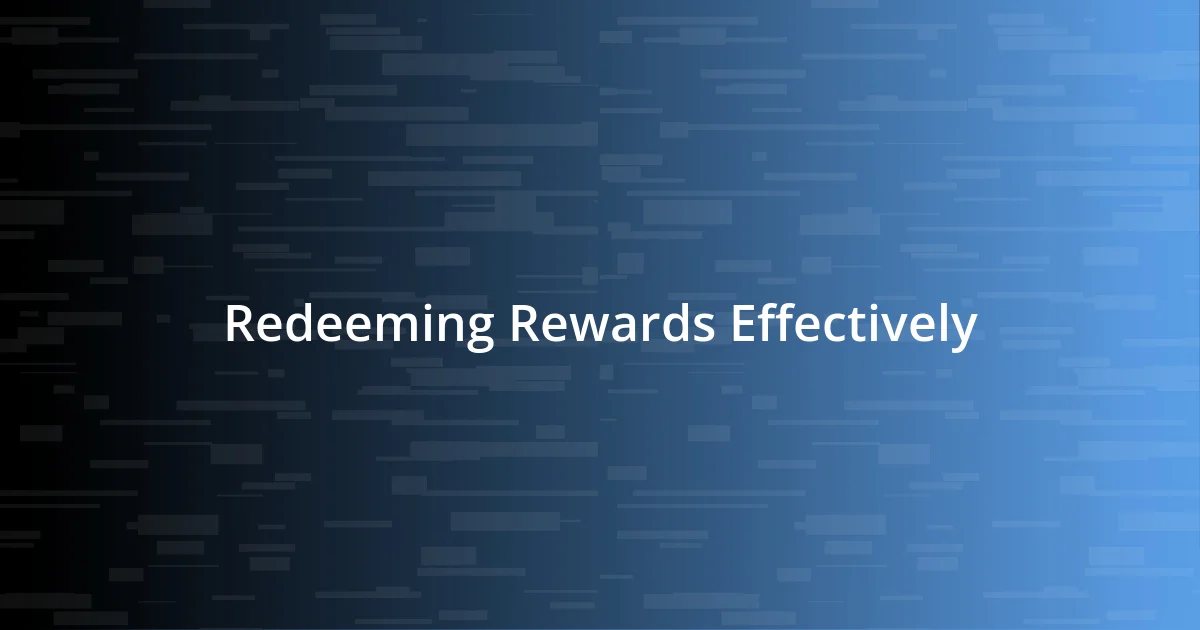
Redeeming Rewards Effectively
Sometimes, the actual act of redeeming rewards can feel a bit like a puzzle. I remember the first time I tried to book a flight with points; it was a thrilling but overwhelming experience. I had to navigate through various platforms and options, feeling a rush of excitement mixed with a pinch of anxiety. It made me realize how crucial it is to fully understand the redemption policies of your rewards program. Have you checked the fine print on your rewards card? Knowing whether your points expire or if there are blackout dates can save you from a last-minute scramble when you’re ready to travel.
I’ve had moments where I redeemed points for gift cards instead of travel, which, while convenient, left me reflecting on whether I truly got the best bang for my buck. One time, I exchanged points for a gift card to my favorite coffee shop. Sure, I enjoyed my lattes, but when I calculated the points I used, I realized I could have booked a weekend getaway instead. It’s essential to evaluate if you’re getting maximum value from your rewards. Are you cashing in on those points at their peak value?
Additionally, I’ve found that planning is key to redeeming effectively. I once set a target to use my points strategically for an off-peak vacation. By timing my booking just right, not only did I secure a flight for a fraction of the cost, but it also led to a delightful experience that felt like a mini-adventure. Have you considered how timing your redemption could create unforgettable moments or even just save you money? It’s all about finding that sweet spot where your plans align with your rewards program’s perks.
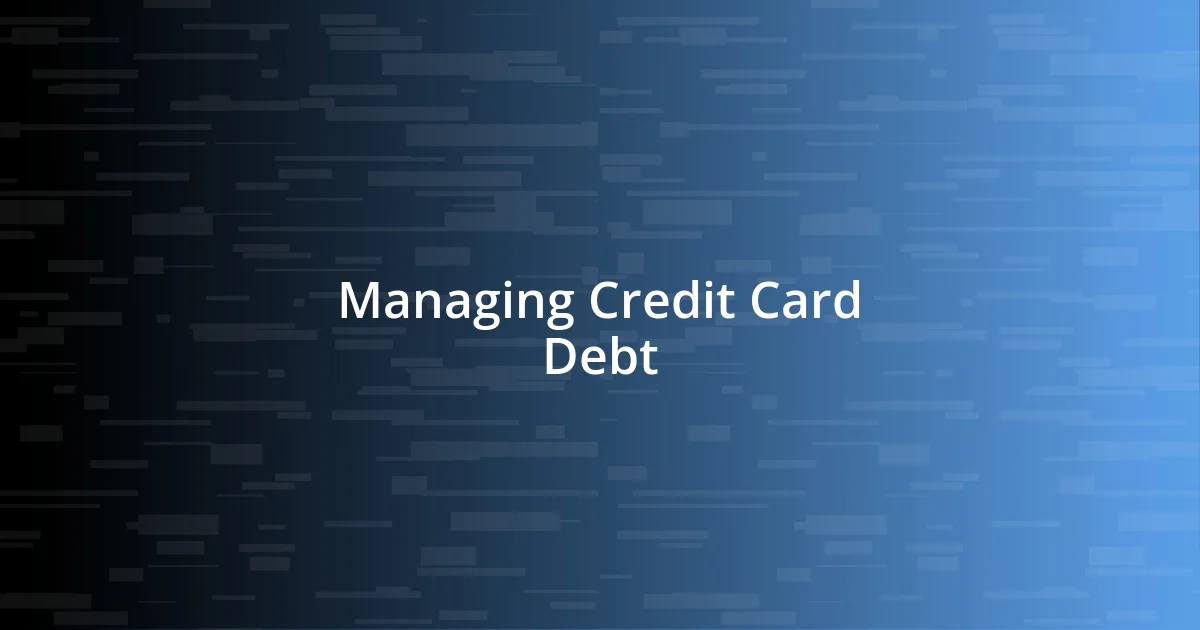
Managing Credit Card Debt
Managing credit card debt can sometimes feel like navigating a maze. I’ve faced my fair share of debt, and one strategy that worked for me was prioritizing high-interest balances first. When I focused on paying off that nagging balance, it felt like lifting a heavy weight off my shoulders. Have you ever felt that sense of relief when tackling your debts head-on?
Another approach that dramatically changed my perspective on managing debt was creating a budget. I set aside a specific amount each month for my credit card payments, treating it like a non-negotiable expense. This disciplined approach not only kept me on track but also allowed me to watch my debt dwindle over time, which was incredibly satisfying. Have you ever crunched the numbers and seen how much progress you’ve made? It’s a rewarding feeling!
Lastly, I’ve found that having a solid plan in place for unexpected expenses is crucial. Once, an unexpected car repair threw my budget for a loop and made it difficult to keep up with payments. Since then, I’ve started building a small emergency fund, helping me handle such surprises without resorting to credit. Isn’t it reassuring to know you have a cushion in place when life throws you a curveball?












